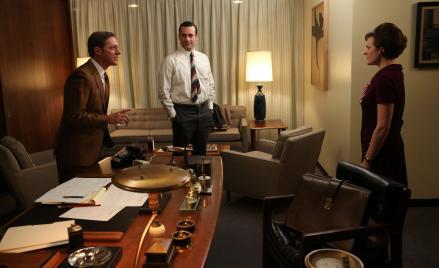Seth, Paul,
Seth, your question about Peggy’s gauzy fantasies of kissing Ted got me thinking about who gets to have immediate release and who doesn’t. This episode, being all about cars, was structured loosely like a road movie, in which the characters get to shift the frame by changing locations. “Throw the map out the window, hit the road Jack,” Ted tells Don in a classic road movie scenario: In a strange bar in a strange town, the two buddies figure out the so-crazy-it-just-might-work solution to their problems. But road movies are traditionally for dudes. The women have to stay behind, tend the hearth, and take their mothers out to lunch because as they keep reminding the men it’s Mother’s Day. (That’s why in Thelma & Louise the two girlfriends get punished for breaking the rules with DEATH.)
The women in this episode have plenty of fantasies—Peggy wants to kiss Ted, Joan wants to be rich, Megan’s mom wants either to be romanced by Roger Sterling or smash a bottle over Peaches’ head as she’s prattling on about puppies—but they get no immediate release, just pent-up frustration. “Don’t you feel 300 pounds lighter?” Don asks Joan when he fires Jaguar. But no, she most certainly does not. In fact, I was struck by how helpful the women were in this episode, how eager they were to relieve the men of their burdens. Ted thinks Peggy is about to say he is nice but instead she says he’s “strong.” Don worries that Megan sees him “desperate and scared,” but the word she was about to use was “fearless,” an exchange which prompts a belt unbuckling and the most obvious immediate release in the episode.
There’s also ever-pliant Daisy, ready to jump back into bed, get Roger on a flight on a moment’s notice, and lose the competition’s luggage. “What more could I give you?” she asks. And that sad closing scene of Peggy, looking suddenly very secretarial and unsure of herself, typing up a press release announcing a change she’s ambivalent about and asking, “Who should I give this to?” Which is why Joan’s response to Don, when he asked her to get the creatives into his office, hit the spot: “Get them yourself.”
Paul, there is another famous verse in Proverbs, the “Wife of Noble Character,” quoted often by evangelicals on Mother’s Day, in which the noble wife, “worth far more than rubies,” works the wool, hauls in the food, gets up in the middle of the night to feed the servants, plants a vineyard and makes money off it, makes the beds, helps the poor, does every damned thing, in other words, while her husband hangs out at the city gate and “takes a seat among the elders of the land.” There’s Don, and there’s the reason Joan isn’t married.
You also mentioned that the best part of advertising is being able to recast the world in a new light with a new story or a few choice words. In this episode more than most I had a sense of the show’s writers constantly recasting the world—the wild, sudden shifts in story that happen as they swing from vine to vine. There was a lot of talk of impulsivity, of who was a pessimist and an optimist, and the rhythm of the episode felt like a series of mood swings. We’re in a business meeting and someone drops the word “cancer.” Don goes into the dinner with Herb miserable and emerges smiling. Megan puts on a short dress and Don is all over her again. And the entire mood of the episode gets shaken up with a song, in this case the fabulous “Baby Jane.”
But moods are impulsive, and as you pointed out, Seth, the high doesn’t often last. The Chevy Vega, the car Don excitedly calls “the future,” nearly destroyed GM. Before the Vega, GM, personified American capitalism—“bold, confident, even arrogant,” as Popular Mechanics notes. Then the car came out. It was wildly popular at first but cheaply made, and soon became known as a “rust-prone bucket” whose engines burned up easily. Because millions of people had bought the car, millions lost faith in GM, and the company couldn’t shift the story about itself for decades to come.
Another ominous note dropped in the episode: Dr. Rosen has quit his job. Doesn’t that spell doom for Don and Sylvia’s daytime trysts in the maid’s room? And one rare possible Mad Men error: Ken Cosgrove comforts Pete with a story about how in high school in Cabot, Vt., he saw his teacher in an ambiguously dirty sex-ed movie in town. My in-laws have a house in Cabot and there is no movie theater there or anywhere within 20 miles and I doubt there ever has been. Vermont history buffs, correct me if I’m wrong.
Some men love women and some love memos,
Hanna
